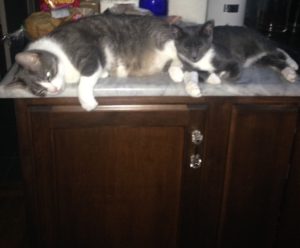“Kitten” Culture and a Generation Clash of Definitions

My daughter – an only, came of age, a millennial. That doesn’t mean she displays all the stereotypical traits of an only and a millennial, only one or two of them. Just like I don’t display all the traits of a curmudgeon, just one will flare up on occasion.
We had a rare tiff over the acquisition, adoption, picking up of a new kitten – for us. She and her fiancé already have two adopted cats and we were left with an only, after our beloved senior, Michaela Jane passed away last year around this time.
I had been unsure and not ready to acquire another cat since I was primarily responsible for several months of the twenty-four-hour nursing care of our beloved seventeen-year-old, Micky and I wasn’t open to taking on new caregiver responsibilities especially of a kitten needing hours of training and patience. I needed to take back my house and heal a bit before I wanted another cat, if ever – the if ever being a real possibility in my mind. I was okay with our only.
Aside from my contentment with an only, it was about the culture of today’s animal adoption. Growing up in the countryside in the 60s, my concept of animal adoption was – a cat or dog was dropped off along the lonely country road and wandered to our house and made itself either comfortable or forlorn looking enough that we took it in and made it our own.
Today’s adoption requires signatures and promises, not to mention prosecutorial threats should you fudge any of said promises you attested to with your name scribbled in cursive.
Our misunderstanding had to do with the definition of indoor. Now some people don’t fuss with word connotations. Other people take it too far (“I did not have ‘sex’ with that woman” as he wags his finger at the camera and prepares his connotation, rendition, definition of the word sex in the back of his mind). Given the facts as played out in the national media it’s hardly even debatable that what he had with that woman, was sex, but whatever.
To my daughter’s animal adoption culture, indoor means going out only on a leash. For my country casual culture, indoor means the pet lives indoors but can gradually go outside for jaunts, once thoroughly accustomed to his surroundings inside and sufficiently grown up. Then, and only then, he can enjoy supervised, unleashed introductions to the lush flora of our backyard. This we feel is prudent – these guidelines then can be loosened up a bit after he has proved he will come inside when his full name is called in the mamma isn’t kidding kind of voice the kids get when misbehaving.
We were stuck for an instant – my daughter and I. Just like we’re stuck – my husband and I, the sandwich generation, between the silent generation (I don’t get that label – I know nobody from that generation that is silent) of our parents and the millennial generation of our children. There’s culture clash written all over us.
About Simpkin G, our new kitten – the G standing for Gloucester, as in the cat from The Taylor of Gloucester from Beatrix Potter. Yes, he was acquired after the short chill had subsided and word connotations sorted out and understood. There are moments – when I aptly call him “crazy eyes” – a descriptive name (or maybe his American Indian name) I assign him when he makes me angry: by threatening to climb the window screens; when he scratches the sofa and runs across my face to leap across the room to scratch the plush upholstered overstuffed chair; when he tries unrelentingly to eat my lunch, on casual days of eating in front of the television; when he literally bounces from surface to surface in a crazed walkabout of some kind that I can’t tap into its purpose but testosterone-infused growing kittens must learn to harness – surely, hopefully.
Simpkin has enjoyed some time-out’s in the basement while I collect myself for another round of his exuberance. He resists, because of his massive display of juvenile energy, passing his interview for second office cat. The result of a tornado strike wouldn’t be a remiss description for his times alone or with Max in the office, unsupervised by human adults. He especially likes to carry out his best hi-jinks while we’re on the telephone – usually with an especially serious human being on the other end of the line. And we’ve had to re-print numerous documents that have been chewed; or re-start a printing job because the manual feed has been pounced upon in mid-production, screwing up the digital intercept. I’ve momentarily wondered when he’s at his wild-animal peaks, or I’ve put yet another memento from a life well-lived – away or up; why I agreed to welcome this unknown creature into our home.
Then, I noticed that Simpkin is awakening bits of my aging brain; with one aggravating act after another. He’s doing the same thing to our ten-year-old cat, Max, who continually annoyed with his taunting, stealing his food, biting his tail, and butting in on his affection from the humans, has become more interested in life – all of life, to which he has grown more alert and extended his lifespan because he’s almost no longer obese (what else can he do as he is a giftedly meek kind of guy and the crazy visitor whom he hopes won’t stay, always plays musical bowls before he’s finished his food).

A number of years ago our daughter brought a kitten home that she tentatively earmarked for gram – an ensconced member of what has been labeled the silent generation (Again I say, who labeled them that? It doesn’t seem like an apt marker for the people I know from that generation). Eleni thought gram needed a kitten to take care of because, living alone for many years and liking cats generally, she thought gram would like the company and something living and breathing to care for outside her own universe. Not so much. Another home was secured for said kitten and gram was happily left alone.
Our three-family made a combined judgment that gram’s rejection of a kitten for herself was baseless and we collectively shrugged it off. In recent years, as my own crotchetiness barometer has climbed, ever so slightly, I get some of gram’s resistances – specifically to the new kitten; hosting family dinners; going out to crowded events, and such.
It seems that the status quo is more comfortable than something or someone new, but…. As I look objectively, kind of, at the word comfortable, it jumps out at me in flashing neon light – that the kind of comfortable the status quo offers is undisturbed, accommodation of one’s own insulated world, with no one or anything else in it, challenging one’s ways, choices, habits, routines or beliefs. That kind of comfortable is self-centered, off-putting by definition and relatively ugly – the opposite of the beauty we may have intended to create when we established our comfortable surroundings in the first place.
What’s comfort without organic, variable, life abounding in, out of, around, and over it – we need prepositions to challenge our minds and enliven our space. What’s beauty without the opportunity to share it – like the tree falling in the forest and no one is around to hear it, does it make a sound?
I’ve had the opportunity to observe two widowed women from the so-called silent generation, both in their late eighties. I admit this minuscule sampling is far from scientifically representative, but my anecdotal observations of these two widows suggest a potentially interesting pattern – a coincidence that matters to me.
One, they are women and two, they are widowed – they have no companion equipoised to balance their views. These are two, no doubt, key variables in their approach to life. They are both fiercely independent, reminiscent of a three-year-old or sixteen-year-old – more oft than not, quoting – “I’ll do it myself.”
Their more than middle-aged children are not perceived as confidantes, protectors, guardians, or dare I say even loved-ones; but as “you people.” They feel their finances, in particular – but all of their personal interests should be private and inaccessible to anyone else – computers and the internet are deeply suspect as are cell phones and other emerging technology. If questioned, they’re deeply offended and vehemently defend their competence to control their own affairs, thank you very much.
A recent dream I had about one of these women, a relative of mine – let’s call her Gladys, pointed out a bottom line lack of receptivity to anything new or present. More important, the dream highlighted a conflict between their generational and my generation’s definitions of family.
A few years ago, a neighbor and I had a conflict of our own over another definition – what is a neighbor, and what are our boundaries? When this woman, her husband and then two-year-old daughter moved in next door, we became friendly; our daughter was around five-years-old at the time. The recent distinction this woman pointed out – not in so few words, nor the same words, was between friendly and friendship. I blurred the two; she distinguished them, sharply.
With over twenty years behind us as neighbors and a dozen or more kid parties under our belts, I thought we were friends and I mistook my corrective advice to her eldest daughter as within my purview as a neighborly, even elder, friend. She didn’t see it that way. She saw our relationship as casually cordial, sociable, and acquainted, but cool, staying at a genial distance, and clear about the invisible boundary in place, of which I was unaware.
I stand corrected; and have adapted to the new paradigm. We live in direct proximity to one another – we are near, close, and adjacent to one another in place, but not in relation.
As to family, we and Gladys couldn’t be further afield in our understanding of family, as our neighbor and I were about the role of a neighbor. Be advised that I have an advanced academic degree in family studies. I know a thing or two about the family unit – through time and across cultures. And, I got tripped up by Gladys about how she sees family compared to how we see it. A clear case of can’t see the forest for the trees.
Gladys’ definition of family is limited to the accurate annotation of relations or, people of similar ancestry. Her emotional definition of family only extends to affable obligatory acts, and demands equality among members – “to be fair.”
My understanding of family widens the connotation to include, emotional connection, importantly – affection, affinity, unity, collaboration, cooperation; and cries out for equity and justice among members. Gladys literally doesn’t get my emotional connotation of family. I get her emotionally-void connotation, and I don’t like it. We agreed to disagree, a stalemate that isn’t the most desirable way to be in relationship, but it is what it is. We’re family, so there you go; checkmate.
The Nonstarter
I was contemplating the sad fact-to-me, that Gladys’ views on family, finances, and fairness haven’t changed in over twenty years, when these views first raised their heads in an environment of deep distress and turmoil in our family. I thought she had changed a few years ago, when there was an unfortunately brief glimpse of a different attitude, demeanor, and approach to the three F’s above – exhibiting a looser, lighter, more balanced and loving life lived. But that change didn’t stick, as we’ve found ourselves with Gladys in a back-to-the-future scenario of tight-fisted, closed-off, bitter tasting deportment in the air surrounding her and her tightly held belongings and property.
Then, as circular thinking goes, I recalled the truism that one can’t change people. We have to accept people the way they are, or fight a losing battle. In fact, the whole of the Serenity Prayer is that we can’t change some things – including people. We have to accept the things we cannot change – including people, if we want them in our lives. Acceptance of them and their way of life doesn’t require us to like them in the moment, or approve of their choices to live a certain way. Acceptance with wisdom means we acknowledge our differences but go forward in relationship in spite of those differences.
I recently came to terms with the fact that I was born, serious. Seriously – pun intended – I came out of the womb solemn, grown-up, pensive, reflective, thoughtful, and sarcastically funny. I didn’t smile for pictures and I didn’t laugh easily. When I got tickled, it was more of a rumble from the deep, bordering on a giggle, than anything resembling a laugh.
I have a great sense of humor, but it’s dry and selective – nothing close to slapstick, absurd, farcical or traditionally comical. Most campy and commercial comedy doesn’t stir me in the least. The intelligent use of puns, witticisms, quips and observations of everyday craziness from the likes of Dave Barry and the old Jerry Seinfeld make me laugh, quietly.
With all the pop psychology floating around since I was born, there have been times that I’ve tried to dilute my serious nature and follow “their” advice and play more; participate in jokes – somehow try to get them and react appropriately (I promise I’ve never been diagnosed as having Asperger’s); have someone else’s definition of fun – in the jovial sense that passes as having a good time; and smile with my teeth in pictures. Epic fail – it’s just not me.
Along with my serious nature – it comes with the package, it seems – is a yearning to dig to the root of a matter, any matter; belabor it, work it, try to explain it, and sort its many variables. Then I have to share it with someone so as to affirm my findings.
Part of my growing acceptance of these traits that God created in me is acceptance of the twin – that some issues don’t deserve to be explained, worked on, concentrated on or paid attention to. It’s the sorting out of which is which, the nonstarter from the justifiably worthy issue – that is currently my priority and at the forefront of my mental and emotional down time.
About Simpkin, I’m adapting to life with a loose cannon. I think he’s relaxing a little bit and so am I. I believe adaptability might be a notable characteristic of ours – the sandwich generation. After all, we came from the loins of the silent generation with one set of deeply honed perspectives that are fixed in stone; and we bore the millennials – another animal from ourselves with a distinctive set of growing preoccupations centered on their own concerns which are entwined with the www opinion of the larger, yet ill-defined culture.
We are the arbiters, mediators, moderators, even holdouts – self-selected decision-makers who settle matters brought to our plates from both our elders and our progeny. Some of what we’re dealing with – across the generations, comes from an ancient source – 2 Timothy 3:1-4: about the last days, with terrible times, when people will be lovers of self, lovers of money, boastful, proud, abusive, ungrateful, without love, unforgiving, slanderous, brutal, rash, conceited, among other, not so flattering, traits.
The thing is, we’re resilient. We shake our heads as we observe our cultural milieu, but we don’t give up. We put one foot in front of the other and we keep going.
Generational traits are attributable to the conditions under which we have grown and developed. It has been said that skin color is an adaptive trait based (many millenniums’ ago) on this same principal of modification of a structure to fit the requirements of one’s surroundings.
Again, I refer to the Scriptures – Proverbs 22:6 to show that people become who they are, in part because they have adapted to the culture into which they are born. “Train up a child in the tenor of his way, and when he is old he will not depart from it” (Darby Bible Translation). Young’s Literal Translation puts Proverbs 22:6 this way – “Give instruction to a youth about his way. Even when he is old he turneth not from it.”
The tenor of a child’s way in Edwardian England was to be seen not heard. I believe my point can be made without getting into all the generation’s varying ways of raising children and the direct link that can be discovered to these people as they’ve aged.
In fact, the silent generation were instructed in the way they should go during the depression when they learned how to survive deprivation; then the boom of the fifties when anything was possible and the sky was the limit, but…. Some of these people developed a bubble of fear – “what if… what if we have another depression, and the good times don’t last?” Saving everything and living deprived so as to secure an uncertain future; and an “I’ll never have enough,” thought pattern and lifestyle had unwittingly developed.
The sandwich generation – we could be called the changing generation, are stuck in between, in the middle of competing values and thought systems. We grew up in what now seems like the stone age, manually doing many things and even though things began to be automated, we have memories of their predecessors: i.e. washing machines (wringer-washers); typewriters (manual with a lever-carriage return); clothes dryers (line-drying); copiers (carbon paper, “wite-out,” inked mimeograph machines); vacuum cleaners (canister-type pull-along’s).
For years now, we’ve adapted to lightning speed technological growth. We were the first to use computers from six-inch square floppy disks, to disc drives in the all-in-one Mac Plus machines to the digital, Wi-Fi present. We grew up with party-line telephones (we shared a telephone line with neighbors), learned to use cell phones when they were the size of a brick and took two hands to operate and now we can hardly let a day pass without text messaging and knowing we have twenty-four access to everyone, everywhere. That’s some change, baby.
We’re the mediating middle, trying to lighten up our elders and tame down our kids – while identifying with characteristics of both, but trying not to be either. Simpkin, the kitten has secured me in my place in the generations – he’s the link that ties our generations together. He shows me what I’m capable of and how flexible I can be. Plus, he purrs; has blinky eyes and looks at me, unafraid and unwavering, right in the eye, even when he has crazy eyes – a sign of a true keeper.
